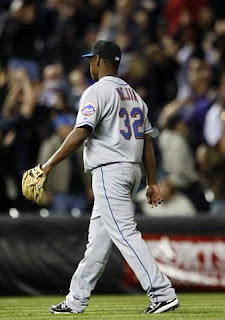Two of those fruits, Jenrry Mejia and Ike Davis are already on the major league roster, and both contributed to a 6-1 victory over the Cubs. Davis's contribution was two hits and an RBI in his major league debut. Despite these contributions I still think both players and the Mets organization would be best served by keeping both players in the minor leagues until September.

Note: this is now largely a hypothetical argument because the horse is out of the barn.
There are several reasons the Mets player development has lagged behind other teams over the past few years. Bad scouting, pennywise pound foolish drafting (the compensatory draft picks the Mets would have gotten for Billy Wagner were more valuable than Chris Carter) and the underestimation of the value of prospects. But perhaps the biggest factor is a lack of patience with developing players.
There are two main reasons not to rush players: the mental and the physical.
As for the physical, most times players need to learn certain skills as they develop, usually for hitters it has to do with breaking pitches: learning to recognize and lay off them, or even to hit them. Similarly most pitchers have reached a certain point with only a fastball or maybe another pitch, they need to pick up something else before they advance to the majors.
I think this is where the Yankees screwed up with Joba Chamberlain. His stunning success as a reliever early in his career came almost too easy. Except when midges were involved. When he tried to transition to a starter he didn't have enough quality pitches to get major leaguers out 20 times a game.
Most people foolishly attribute Chamberlain's problems to the "Joba Rules" the guidelines the Yankees used to limit his innings. This is not the case. Baseball history is littered with young pitchers who threw too many innings too soon and blew out their arms (Kerry Wood and Mark Prior). Studies have proven that a jump of more than 50 innings pitched from one season to the next greatly increases the risk of injury.
This is why the Mets would have been smarter to let Mejia use 2010 to be a starter in the minor leagues with a moderate increase in innings (he threw 94 in 2009), then next year as a Mets starter on an innings limit of about 170 and finally turn him loose is 2012. That would be the safest approach to building a guy who can be a good starting pitcher for many years to come.

The argument against Ike Davis's promotion is more of the mental aspect since by all accounts he is ready to hit major league pitching despite having fewer than 300 at bats above A ball. Mets fans are very impatient, especially with young hyped prospects and when Davis struggles as I'm sure he will, the fans will boo and blast Davis on WFAN as another Mets bust. Especially because right now the Mets offense is so bad Davis is being called upon to be the savior.
In 1998 the top two quarterbacks in the NFL Draft were Peyton Manning and Ryan Leaf. You may not believe it now, but at the time public opinion on them was split, or at least close. We know what happened since then, Manning went on to be a top 5 QB of all-time, Leaf a top 5 bust of all-time. So how did two guys who were seemingly so close end up so far away?
We will never know the answer to that and that is exactly the point. All of this stuff is unknowable. It's impossible to know if Jenrry Mejia will get hurt, or if Ike Davis's confidence will get destroyed if he slumps and gets booed at CitiField. And there is no guarantee more time in the minors will change anything. But is it worth the gamble? Would you be willing to trade this year's production from Mejia and Davis for an increased likelihood those guys will have long successful careers as Mets?
I would, but I'm in the minority as the Mets and Mets fans once again put short-term fixes above long-term solutions.
2 comments:
In all fairness on the Billy Wagner issue it was extremely risky to offer him arbitration on the chance that he would accept, then Sox (or Mets if didnt trade him) would be stuck paying him probably around $8M for one year.
In hindsight getting two picks over Chris Carter (who should have been on the team before Jacobs) would have been great. But if they offer him arb and he accepts Minaya would never hear the end of that. At least they got something for him
I see by that first picture that Ike Davis has met Scott Isaacs...
Post a Comment